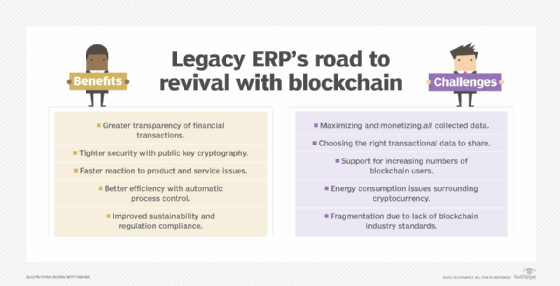Pros and cons of blockchain for ERP
ERP's longevity reaches back to the 1960s, but thanks to blockchain, an old dog may well learn some new business tricks in this ever-changing and modernizing world of technology.
Compared to the decades-long history of ERP systems, blockchain is in its infancy. And with the taste of the 2022 Bitcoin crash still sour in investors' mouths, blockchain may be difficult to introduce or build upon in an enterprise environment. But despite the bad rap dropped on cryptocurrency, blockchain has the potential to modernize ERP systems for today's business environment.
Industry experts agree that ERP vendors must embrace new technologies, including blockchain, to stay relevant and handle issues that didn't exist in the days of on-premises systems and mainframes. Blockchain for ERP comes with plenty of potential to solve common business problems. ERP vendors like SAP and Oracle are already constructing their own blockchain ecosystems, often focusing on obvious use cases like supply chain operations.
How blockchain works with ERP
There are four main types of blockchain: public, private, hybrid and consortium. All are based on the same distributed ledger technology -- a platform that uses ledgers stored on separate, connected devices in a chain maintained by a network of computers to ensure data accuracy and security. Each of the blocks in the chain contains a set of data. Since each block is linked to the previous block, it's very difficult to change or delete data on the blockchain. Any changes would be immediately visible to the entire network.
Unlike blockchain, ERP is a software system that integrates a company's core business processes. ERP is used to streamline processes, while blockchain creates a secure record of transactions. Since ERP systems are considered the "system of record" for so many organizations, blockchain seems like a natural complement to ERP. In a supply chain, for example, ERP automates ordering and shipping, while blockchain can track the movement of goods. Integrating the two could make the process more secure and efficient.

Blockchain ERP applications
ERP vendors have already added or are discussing adding blockchain to their offerings. SAP, Oracle and Microsoft have all jumped on the blockchain bandwagon.
SAP introduced SAP Leonardo in 2019, which builds on the open source Hyperledger fabric supported by the Linux Foundation and allows organizations to track goods and materials moving through the supply chain in real time. Oracle lets businesses create secure and transparent supply chain networks with its blockchain platform for supply chains. After the discontinuation of its Azure blockchain service, Microsoft released Azure confidential ledger to integrate blockchain.
Blockchain has also been used for applications such as food safety, first with leaf-based products for Walmart, according to Kevin Beasley, CIO at ERP software developer VAI. These types of products were reported to have the most issues and problems. By integrating blockchain, and with the help of good IoT data, Beasley noted, the root cause of a product recall could be narrowed to a particular point along the supply chain.
"ERP normally just sees data within its four walls," Beasley explained. "Blockchain allows ERP and other applications to see data as long as they have permission." Transportation managers, for example, can see when shipments are picked up or plan for when they're ready.
Blockchain lends itself to predictive analytics as well, such as combining data with weather conditions to anticipate trends, Beasley added. "There's a tremendous amount of analysis you can do on blockchain, especially consortium-based or private blockchains," he said. "You might make additional money by letting others analyze data anonymously, like weather trends or yield rates. There's a lot of useful information after the fact."
Benefits of integrating blockchain into ERP systems
Integrating blockchain into ERP systems can provide a host of business benefits.
- Greater transparency. ERP is the system of record for the transactional aspects of running a business, such as purchase orders, inventory requests and the supply chain. Blockchain provides traceability throughout the lifecycle of a product as well as transparency of financial transactions, said Kevin Miller, CTO, Americas, at ERP software developer IFS.
- Tighter security. The public key cryptography used by blockchain better encrypts supply chain data. Once quantum computing and quantum-safe cypher keys become more available, Beasley surmised, blockchain can create immutable records and data to protect against ransomware.
- Faster recalls. Blockchain provides the entire history of a shipment, from a product's origination to its destination along the supply chain. Product recall issues can be addressed more quickly.
- Better efficiency. When shipments arrive at a warehouse, they can be scanned into the system and automatically become part of the inventory without the need for manual intervention.
- Improved sustainability. The transparency and traceability provided by blockchain can help determine a product's carbon footprint and environmental offset across a range of industries, Miller said.
Drawbacks of integrating blockchain into ERP systems
Integrating blockchain into ERP systems isn't without its share of hurdles and challenges to overcome.
- Understanding and capitalizing on the full benefits of blockchain beyond simply meeting compliance obligations. "There are other things that you can get out of it," Beasley said, adding that many companies don't maximize the information they gather and fail to use that data for applications like predictive analytics.
- Choosing the appropriate transactional information to be processed on the blockchain. Certain data might be too proprietary or confidential for a shared database blockchain system.
- The growing numbers of blockchain users. "If we suddenly add millions of users into the chain," Miller conjectured, "will we have issues supporting them?"
- The amount of energy consumed by cryptocurrency and the blockchain and what will be needed to maintain it.
- Lack of industry standards for blockchain, and not just for its integration into ERP systems. "Certain trade groups are trying to outline standards," Miller reported. "But there is not really a widely accepted overall standard system that applies to blockchain, and it tends to be fragmented."







